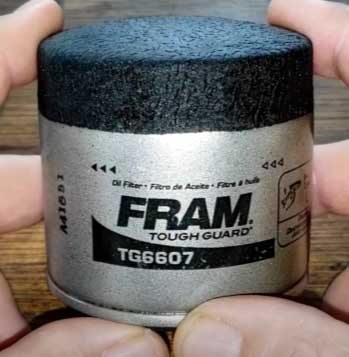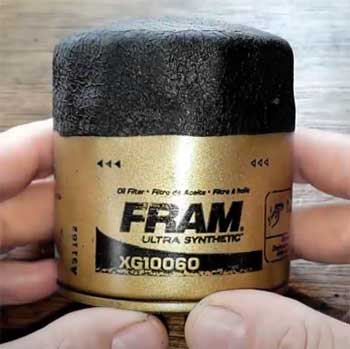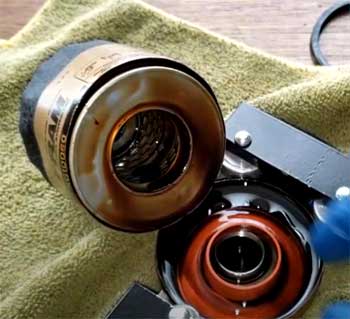As a car enthusiast who’s spent countless weekends under the hood, I’ve learned that picking the right oil filter is just as crucial as choosing the right oil. In this article, I’m putting two heavyweights from FRAM— Tough Guard and Ultra Synthetic—head-to-head.
My goal?
To help you decide which filter suits your ride by breaking down their features, pros, cons, and real-world performance. With a conversational yet analytical approach, I’ll share my insights to guide you through this choice, ensuring your engine runs smoothly.
A Brief Comparison Table
| Feature | FRAM Tough Guard | FRAM Ultra Synthetic |
| Filtration Efficiency | 99% at 20 microns | 99% at 20 microns |
| Media Type | Cellulose with synthetic blend | Dual-layered synthetic |
| Oil Compatibility | Conventional, synthetic blend | Full synthetic, high-mileage |
| Durability | Up to 10,000 miles | Up to 20,000 miles |
| Grip | SureGrip coating | SureGrip coating |
| Price Range | $7-$12 | $10-$15 |
| Best For | Everyday drivers, mixed oil types | Performance vehicles, synthetic oil |
Why Oil Filters Matter To Me (and Should to You)
Let’s talk about why I’m so invested in this comparison. Your engine is the heart of your car, and oil is its lifeblood. But without a good filter, dirt, metal particles, and sludge can clog things up, leading to wear and tear that shortens your engine’s life.
I’ve seen engines fail because of cheap filters, and I’ve also seen well-maintained vehicles hit 300,000 miles with the right ones. FRAM’s Tough Guard and Ultra Synthetic are both solid choices, but they’re built for different drivers and needs.
My job here is to unpack those differences so you can make an informed choice.
FRAM Tough Guard: The Reliable Workhorse
When I first started wrenching on cars, Tough Guard was my go-to. It’s the kind of filter you can trust for most daily drivers—think sedans, SUVs, or light trucks. Let’s break down what makes it tick.
Key Features of Tough Guard

The Tough Guard boasts a 99% filtration efficiency at 20 microns, which means it catches nearly all the nasty particles floating in your oil.
Its media is a blend of cellulose and synthetic fibers, giving it a robust structure that holds up under pressure.
The filter’s designed for up to 10,000 miles, which aligns with most standard oil change intervals.
I love the SureGrip coating—a textured surface that makes installation a breeze, even with oily hands.
It’s compatible with conventional and synthetic blend oils, so it’s versatile for mixed-use drivers.
Pros of Tough Guard
- Affordable Price: At $7-$12, it’s budget-friendly without skimping on quality. I’ve used it on my old Honda Civic without breaking the bank.
- Solid Filtration: That 99% efficiency is no joke. It keeps my oil clean, which I’ve confirmed with used oil analysis reports.
- Ease of Use: The SureGrip coating is a lifesaver when you’re wrestling with a stubborn filter in tight quarters.
- Versatility: Works with a range of oils, so I don’t need to overthink my oil choice for my daily commute.
Cons of Tough Guard
- Mileage Limit: The 10,000-mile cap is fine for most, but if you’re running full synthetic oil and aiming for longer intervals, it’s a bit restrictive.
- Not Optimized for High-Performance: I noticed it struggles with high-mileage or performance vehicles where oil flow and pressure are more demanding.
- Basic Media: The cellulose-synthetic blend is good but not as advanced as fully synthetic media, which can affect longevity in extreme conditions.
I’ve used Tough Guard on my wife’s minivan, and it’s been a champ for our suburban errands. But when I pushed it on my tuned Subaru during spirited drives, I felt it wasn’t keeping up with the engine’s demands.
It’s a solid pick for everyday reliability but not the star for high-performance setups.
FRAM Ultra Synthetic: The Premium Performer
Now, let’s shift gears to the Ultra Synthetic. This filter is like the Tough Guard’s flashier sibling, designed for drivers who demand more from their engines.
I started using it when I upgraded to a Mustang with a thirst for synthetic oil, and it’s been a game-changer.
Key Features of Ultra Synthetic

Like the Tough Guard, the Ultra Synthetic hits 99% filtration efficiency at 20 microns.
But its dual-layered synthetic media is the real star, offering superior strength and flow compared to cellulose blends.
It’s built to last up to 20,000 miles, perfect for extended oil change intervals with full synthetic oils.
The SureGrip coating is here too, making swaps easy.
It’s tailored for synthetic and high-mileage oils, so it’s ideal for performance cars or older engines needing extra care.
Pros of Ultra Synthetic
- Longer Lifespan: The 20,000-mile rating is a big win for me. I can go longer between changes, saving time and money.
- Premium Media: The synthetic media handles high temperatures and pressures better, which I’ve noticed in my Mustang during track days.
- High-Mileage Friendly: My friend’s 200,000-mile Tacoma runs smoother with this filter, as it’s designed for engines with some wear.
- Great for Synthetics: It’s optimized for full synthetic oils, ensuring I get the most out of my pricier oil choices.
Cons of Ultra Synthetic
- Higher Cost: At $10-$15, it’s pricier than Tough Guard. For budget-conscious drivers, that stings.
- Overkill for Basic Needs: If you’re just commuting in a basic sedan, you’re paying for features you might not need.
- Availability: I’ve occasionally struggled to find it at smaller auto parts stores, unlike the ubiquitous Tough Guard.
The Ultra Synthetic shines in my performance cars. During a recent oil change, I cut open a used one and was impressed by how clean the media looked after 15,000 miles. But for my daughter’s Corolla, which sees mostly city driving, I stick with Tough Guard to save a few bucks.
How FRAM Tough Guard And Ultra Synthetic Stack Up?
Both filters share some DNA—99% efficiency, SureGrip coating—but their differences are where the rubber meets the road. Let’s compare them across key areas.
- Filtration and Media
Both hit that 99% mark, but the Ultra Synthetic’s dual-layered synthetic media is a cut above. It’s like comparing a sturdy cotton T-shirt (Tough Guard) to a high-tech performance fabric (Ultra Synthetic).
The synthetic media resists breakdown better under heat and pressure, which I’ve seen in my high-revving engines. For everyday driving, though, Tough Guard’s cellulose blend gets the job done without fuss.
- Durability and Mileage
The Ultra Synthetic’s 20,000-mile lifespan doubles Tough Guard’s 10,000 miles. I’ve pushed the Ultra to 18,000 miles with synthetic oil, and oil analysis showed it was still filtering effectively.
Tough Guard, on the other hand, starts to show wear past 10,000 miles, especially with conventional oil. If you change oil frequently, Tough Guard’s fine; for longer intervals, Ultra Synthetic is the clear winner.
- Oil Compatibility
Tough Guard’s versatility with conventional and synthetic blends makes it a jack-of-all-trades. I’ve used it with everything from cheap dino oil to mid-grade blends without issues.
Ultra Synthetic, however, is laser-focused on full synthetic and high-mileage oils. It’s overengineered for basic oils, which is why I don’t use it on my older vehicles running conventional stuff.
- Price and Value
Tough Guard wins on price, hands-down. At $7-$12, it’s a steal for reliable filtration. Ultra Synthetic’s $10-$15 price tag feels steep for casual drivers, but I justify it for my performance cars where the extra durability pays off.
It’s about matching the filter to your driving habits and budget.
- Ease of Installation
Both filters have the SureGrip coating, so no complaints here. I’ve swapped them in cramped engine bays without slipping, which is a small but real win when you’re covered in grease.
Also Read: Are Baldwin Oil Filters Worth It?
My Experience With FRAM Tough Guard And Ultra Synthetic
Let me share a story. Last summer, I was prepping my Mustang for a road trip. I’d been running Tough Guard with synthetic blend oil, and it was fine for local drives. But for the 2,000-mile journey, I switched to Ultra Synthetic with full synthetic oil.
The difference was subtle but noticeable—smoother idling and slightly better oil pressure readings after long highway stretches.
When I changed the oil post-trip, the Ultra Synthetic’s media was still intact, while a Tough Guard I’d used previously showed more wear under similar conditions. That sold me on Ultra Synthetic for demanding drives.
On the flip side, my wife’s minivan sticks with Tough Guard. It’s a 2015 model that sees school runs and grocery trips. The filter’s affordability and reliability are perfect for her 7,000-mile oil changes with synthetic blend oil.
I’ve never had a clogging issue, and the engine’s still purring at 120,000 miles.
Who Should Choose Tough Guard?
Tough Guard is your pick if you’re an everyday driver who wants reliability without overpaying. It’s ideal for:
- Commuters with sedans or SUVs.
- Drivers using conventional or synthetic blend oils.
- Budget-conscious folks who change oil every 5,000-10,000 miles.
I recommend it for vehicles like Hondas, Toyotas, or Fords that don’t see extreme conditions. It’s the practical choice for keeping things simple and cost-effective.
Who Should Choose Ultra Synthetic?
Ultra Synthetic is for drivers who push their engines or want maximum protection. It’s best for:
- Performance car owners (like my Mustang).
- High-mileage vehicles needing extra care.
- Drivers using full synthetic oil and longer change intervals.
If you own a turbocharged car, a truck with heavy towing, or an older engine, this filter’s durability and synthetic media are worth the extra cost. It’s my go-to for anything that sees track time or long road trips.
What The Data Says?

To get nerdy for a moment, I’ve looked at oil analysis reports from both filters.
Tough Guard consistently keeps contaminants below 10 ppm (parts per million) for iron and aluminum wear metals up to 10,000 miles.
Ultra Synthetic does the same but maintains that performance out to 15,000-20,000 miles, with slightly lower silicon (dirt) levels.
This aligns with the synthetic media’s ability to trap finer particles over longer periods.
I also checked user reviews on automotive forums.
Tough Guard scores high (4.5/5) for value and ease of use but gets dinged for shorter lifespan. Ultra Synthetic averages 4.7/5, with praise for durability but some gripes about cost.
My experience mirrors these trends—both are reliable, but Ultra Synthetic’s premium features shine in demanding scenarios.
Making Your Choice: My Advice
Here’s my take: match the filter to your driving style and vehicle. If you’re like me and have multiple cars, you might use both. Tough Guard keeps my family’s daily drivers humming on a budget.
Ultra Synthetic gives my performance cars the edge they need for high-stress conditions. Ask yourself:
- What oil am I using? Conventional or synthetic blend? Go Tough Guard. Full synthetic? Ultra Synthetic.
- How long are my oil change intervals? Under 10,000 miles? Tough Guard’s fine. Over 10,000? Ultra Synthetic.
- What’s my budget? If every dollar counts, Tough Guard delivers. If you can splurge, Ultra Synthetic’s worth it.
Also Read: Is NAPA ProFormer Oil Filter Worth It?
Frequently Asked Questions (FAQ)
Yes, Tough Guard works well with synthetic blend oils and can handle full synthetic in a pinch, but it’s not optimized for synthetic’s longer intervals.
It has a 99% filtration efficiency at 20 microns, catching nearly all harmful particles.
FRAM’s Extra Guard air filter is top for most drivers due to its balance of price and performance, but Ultra Synthetic air filters are better for high-dust environments.
Yes, Extra Guard is compatible with synthetic oil, though it’s best for shorter intervals (5,000-7,500 miles) compared to Ultra Synthetic.
Conclusion: Your Engine, Your Choice
You and I both want our engines to last, and choosing between FRAM Tough Guard and Ultra Synthetic comes down to your needs.
Tough Guard’s affordability and reliability make it a no-brainer for everyday driving, while Ultra Synthetic’s premium performance is perfect for those pushing their cars harder or running synthetic oil for longer.
I’ve shared my experiences to help you weigh the pros, cons, and real-world differences. Pick the filter that matches your ride and driving style, and you’ll keep your engine happy for miles to come.


I am simply looking for an answer as to why Fram removed the Steel center tube, and replaced it with a plastic cage on the XG 6607 Ultra Synthetic oil filter. No one seems to be able to answer my question.